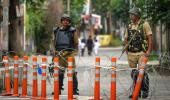'The general perspective -- certainly on Capitol Hill and Congress -- the love for India, the positive feeling for India still focuses on India as a democracy.'
'The more that Indian democracy and its pluralistic features is called into question by Indians, the more that same debate will replay back here.'
Illustration: Dominic Xavier/Rediff.com
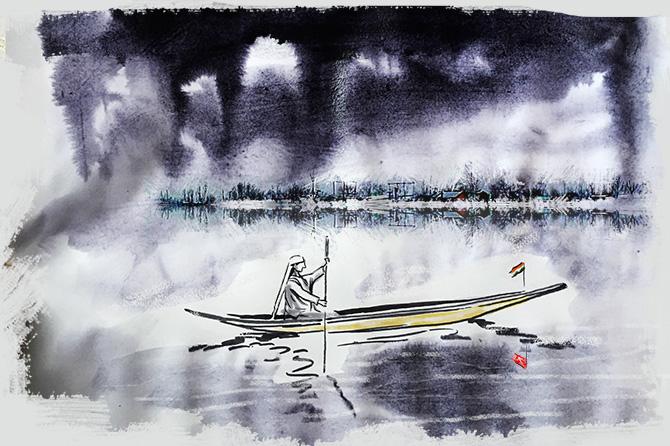
The changes made in India's Constitution to resolve the situation in Jammu and Kashmir could risk its moral standing in the US as the world's largest democracy, and be viewed as only a strategic partner on the lines of Saudi Arabia.
That was the view of Daniel S Markey, a South Asia expert who is a senior research professor and academic director at the Johns Hopkins University's School of Advanced International Studies.
He is also the author of China's Western Horizons, about that country's shifting political, economic, and security connections with those to its west, including India, Pakistan and Russia.
Markey said that many in the Beltway put India's actions down to something the US administration did -- whether it be President Donald Trump's assertion that India had sought his intervention in Kashmir, the visit of Pakistani Prime Minister Imran Khan to Washington, or the discussions involving the US role in Afghanistan.
"I think they seriously overstate the US role in any of this," Markey said, "I would be much more inclined to see this as a story of Indian domestic politics of a Bharatiya Janata Party government -- and a Modi government, not just a normal BJP government -- that proves itself quite popular in the last elections and is ready to capitalise on and demonstrate the consequences of that power.
"Kashmir is something that's been in the manifesto of the BJP for many, many years and so it's time to take action.
"Whether it happened this month or last month or the next month or a year from now, I would say this was something that was brewing in the BJP leadership.
"I feel a better question would be, why they didn't do it in the last [BJP] government."
Markey said this is a particularly propitious moment for a popular -- and populist -- government to take action like this.
"The world is seeing China cracking down -- or potentially cracking down -- in Hong Kong, China engaging in repressive tactics in Xinjiang, the United States doing nothing about it, Russia taking steps... I could go on.
"The world situation has opened this as an opportunity to India that makes [for a] relatively lower cost outcome than it might have been 15 years ago."
Markey doubted that China would be interested to go all out to help Pakistan, despite it being an ally and despite its strong statements about the impact on Kashmir and Ladakh due to the recent changes in the constitution.
"Hong Kong, Xinjiang, Taiwan, Tibet are way more important to China than what's happening in Kashmir," he said.
Perhaps not Kashmir, but was Ladakh not important, given the Indo-Chinese dispute about the border?
"Of course, China's unhappy about it.. If China's smart it will sit back and see what unfolds.
"It can register its diplomatic concerns with India.
"But my sense is that patience for China -- or for that matter, Pakistan -- would go a long way [to help].
"I don't think this will be a popular move in Kashmir.
"Maybe in Ladakh it's also a problem but in the valley it's going to be unpopular.
"And India will pay a price for it."
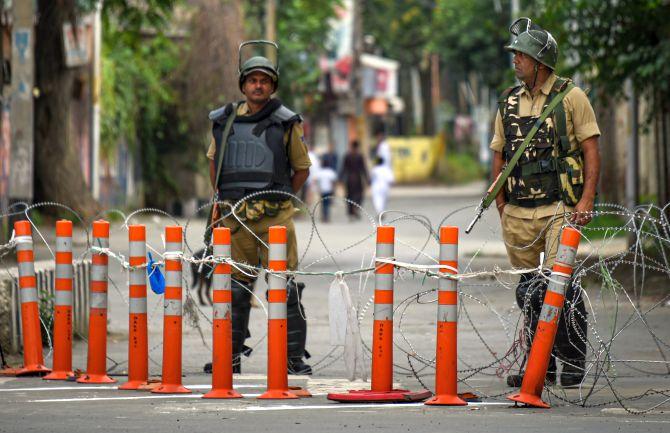
Markey believes that police, military and paramilitary presence in Kashmir will have to be reduced at some point.
"There will be protests," he said.
"At the moment it's anyone's guess but it's almost impossible to imagine that this is going to go down quietly... Whether it takes a little while to bubble up or it happens all of a sudden... It will be difficult to manage. I'm not saying India can't manage it."
About news leaking out about protests and repression in Kashmir, Markey said the scattered reports could amount to something a great deal more.
"It will be impossible for the world not to see it, but it won't be impossible for India to continue along these lines," he said.
"This is a state with considerable repressive capacity, and for much of India that's going to be a price worth paying."
He said the risk of a military confrontation between India and Pakistan had certainly increased.
According to Markey, recent hints dropped by Rajnath Singh, India's defence minister, about India's no-first-use policy on nuclear weapons being open to change were only one factor.
"India's daring push of the envelope by launching a reprisal attack for Pulwama into Pakistan was a big deal.
"It could have resulted in considerably worse and greater escalation. But it didn't," he said.
Pulwama was where a Kashmiri suicide bomber backed by Jaish-e-Mohammed, a Pakistan-based terrorist group, killed 40 Indian paramilitary personnel, causing outrage across India.
"When both sides are pushing the envelope in ways that made people here in Washington pay attention," he said. "It makes people here nervous."
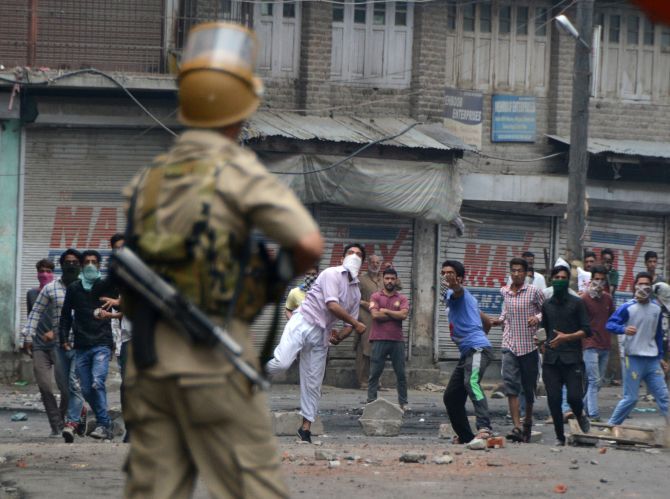
He addressed the question of how other countries, including China, could view the potential for hostilities between India and Pakistan.
"Look, I don't think anybody else wants to see that. Certainly, China doesn't," Markey said.
"They made it clear that on the one hand they are super friends with Pakistan and want to be seen by the people of Pakistan that way.
"On the other hand, whatever tensions rise, they do counsel a degree of restraint and also recognise that they have real stakes with India.
"In the past year, with India, they've done a fair amount of homework to try and improve their relationship.
"They don't want to see that disappear.
"I think that outside of India and Pakistan, there is not much interest in being sucked into this.
"On the contrary, there is every interest in reducing the prospect of it spilling over into other areas.
"I don't think that means that [conflict] won't happen, but it's not motivating China.
"China's not egging Pakistan on. China's not eager to see an Indo-Pakistan conflict.
"China's not eager to get sucked into one.
"Chinese people -- engineers and workers and so on -- are on the ground in Pakistan.
"If an India-Pakistan war broke out, China would have a considerably greater set of interests [at risk] in Pakistan now than it did even a decade ago."

The expert agreed that China has made strategic investments in Pakistan, such as in the Gwadar port in Balochistan.
"They have strategic interests, but they have long-term strategic interests, and it's probably [something] they could be patient about.
"Gwadar is not going to deliver a strategic benefit to China in the next year.
"But, over the next 20 years, yeah!"
So what does India's decision on Article 370 mean in the long term?
"The core question, at least from a Washington perspective is, what does this tell us about Indian democracy...? That's a debate in India," Markey said, "This is not just a Washington debate.
"But the consequences of that debate in India will reverberate back into the US debate -- not immediately but over time.
"The reason I point that out is because the core proposition here, certainly since the Clinton administration, the Bush administration... is that India as the world's largest democracy is a natural partner, if not an ally, to the United States.
"But the word 'democracy' is quite important to that proposition.
"Subsequently, many American strategists have tended to focus more on India's role as a potential counterbalance to China and to focus less attention on the democracy issue.
"But the general perspective -- certainly on Capitol Hill and Congress -- the love for India, the positive feeling for India still focuses on India as a democracy.
"The more that Indian democracy and its pluralistic features is called into question by Indians, the more that same debate will replay back here.
"Then there will be additional questions about just what kind of democracy is India and how much weight should we put on that part of its identity.
"The consequence of that will be just how important is our relationship with India.
"If it's just as a China counterbalance, then we don't care whether they are a democracy or not.
"But if it is something to do with identity; and shared values and so on, then these types of things raise important questions."
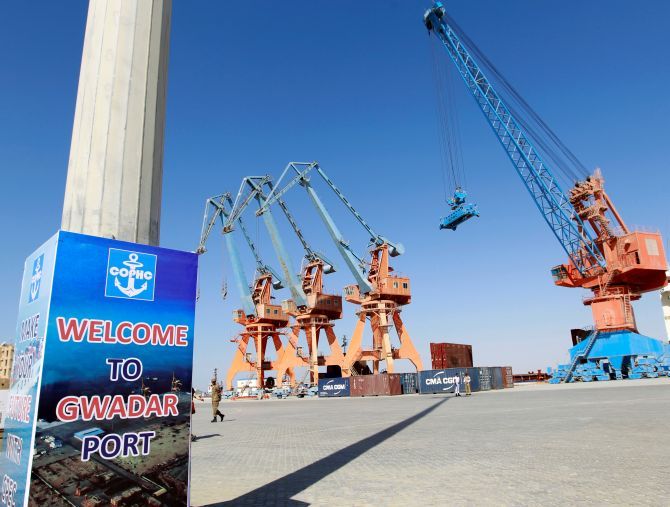
Were final political decisions often taken on the basis of strategic issues rather than moral ones?
"Exactly, exactly. But the morals or values or ideologies -- whatever you call them -- have some political consequence," Markey said.
"Let me put a finer point on it.
"Here in Washington, people have to make decisions as to how they spend their time, where they devote their attention, what causes they want to pick up and become champions of, and the more popular things -- like India has been, for well over a decade now -- the more likely you are to see Congressmen and senators and private citizens take that up as a cause of improving relations with India.
"The less popular it is, the less time [is spent].
"Even if the strategic weight of India continues to grow, the less likely people are to devote themselves to it.
"Saudi Arabia would be a good example. We still need Saudi Arabia as a strategic partner. They are still very relevant to US national interest but it's very unpopular right now.
"As Congress has shown, when it becomes very unpopular, then it can be difficult, even for, say, the Trump administration to move policies and arms sales and other things to Saudi Arabia -- even if it's a strategic partner."
 IMAGE: Daniel S Markey
IMAGE: Daniel S MarkeyMarkey said that liberal democracies could question the steps India has taken in Jammu and Kashmir.
"[They] will be watching and waiting to see how this unfolds, and how India manages dissent.
"The UK, France, Germany and so on -- they'll care.
"But I would say it's reasonable to see how this will actually play out in the US-India context because that relationship has been more significant, say, more than the Europe-India relationship.
""You could imagine a situation where China was very sharply critical of India for taking these steps.
"But I haven't seen that so far.
"They've made some criticism but that's been pretty light.
"I think that's because they are much more worried about what's happening at home... Those who are living in glass houses should not throw stones.
"Russia has already come out and more or less said what India's doing is fine, which kind of supports its own strong State populist agenda."
More broadly, Markey said he saw a shift towards populism and authoritarianism across the world, one based on personal, economic or national security.
"That's a global trend. Certainly India is not alone in taking these moves that emphasise those points and downplaying the consequences for individual rights and freedoms.
"That's 2019. That's happening everywhere."
Another issue of concern for Markey was how a future India-Pakistan conflict might unfold, given how polarised all the parties were.
"Every reason [for conflict] is now worse.
"Every incentive among spoilers in Pakistan and the Pakistani State has gotten worse," he said.
What incentives?
"The true hardliners in Pakistan and extremists who wanted to cause trouble for India for decades now have even more reason to want to take action.
"Those who might be somewhat less eager, for whatever reasons, to do that have fewer arguments.
"And the public is actually enraged or is being encouraged to be enraged... If Pakistan were smart, it could sit tight and be patient, but I worry they can't do that.
"Not that they shouldn't do that.
"They should but they can't find it within themselves to have the political patience to wait."

